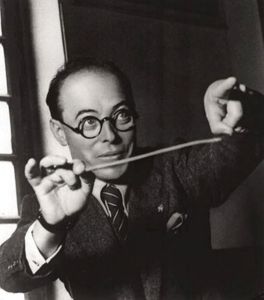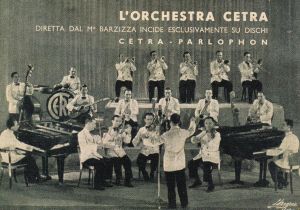Composer, Orchestra Conductor and Arranger
 Pippo Barzizza was born in Genoa on 15th May 1902. When he was very young he learned to play the violin.
Pippo Barzizza was born in Genoa on 15th May 1902. When he was very young he learned to play the violin.
A student of engineering, he neglected his studies to perform in the clubs of his city: music was his true vocation.
A restless and curious instrumentalist, he moved from the violin to the piano, the accordion, the sax and the drums, until he reached the 'new shores' of composition and orchestration.
After working as an instrumentalist in the orchestral ensembles conducted by the Fratelli Di Piramo, he began to create ensembles of which he was arranger and conductor - in this regard we remember the legendary "Blue Star", with which he made his debut in Milan in 1925.
The success was not long in coming: his 'American' style - with a lot of swing, and a highlighted wind section - was innovative and striking. In 1936 he became permanent conductor of the Orchestra Cetra with which he broadcast on the National Radio (Eiar).
In 1936 he became permanent conductor of the Orchestra Cetra with which he broadcast on the National Radio (Eiar).
His collaboration with successful singers - Alberto Rabagliati, Norma Bruni, Silvana Fioresi, Otello Boccaccini, Trio Lescano, Natalino Otto... and the broadcast over the air marked his success on a large scale.
His "Canzone del Boscaiolo" was on everyone's lips, as well as "Sera", the closing theme song of his band.
The 'palm of popularity and critics' was fought over by Cinico Angelini, who was in favour of a less rhythmic, more traditional and melodic orchestration.
Between the '30s and '40s he intensified his career as a composer in Turin.
He passed with ease from one genre to another, a summa of the musical genres in vogue in Italy in those years.
Then there was the war, but his activity during and after the war continued, for over a decade, and in the post-war period he became a film music composer.
Married happily, Barzizza had two children: Isa, destined to become a famous showgirl and actress for cinema, TV and theatre, and Renzo, active in communication and advertising.
In the last years of his life he retired to live in Sanremo, where he continued his activity as musician and composer writing some dialectal pieces for the Famija Sanremasca and providing his collaboration to the "Compagnia Stabile Città di Sanremo".
During the Sanremo years his home had become a school of music and singing.
He died in Sanremo on 4th April 1994. He was appointed an honorary citizen of Sanremo.
In addition to numerous musical works, from songs to soundtracks, from radio fantasies to sacred music, Barzizza's treatise "L'orchestrazione moderna nella musica leggera" (Modern orchestration in light music) remains a true vademecum for those who work in the field, which for over fifty years has been a very useful tool for anyone who approaches - according to its definition - the "Noble Art of Arrangement".
(text based on notes by A.Gandolfo)




